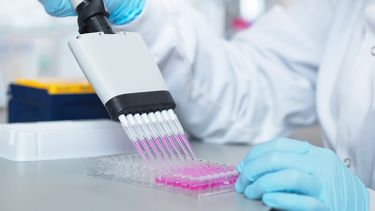A major interdisciplinary study has brought together teams of engineers, scientists and clinicians from across the University of Sheffield to find a way to manufacture SARS-CoV-2 (Covid-19) proteins en masse to set up over 2000 antibody tests.
The unique capabilities at the University allowed diverse teams from across the departments of Infection, Immunity and Cardiovascular Disease, Chemical and Biological Engineering and Biomedical Science to rapidly re-focus their energy into new ways to support the fight against the Covid-19 pandemic.
Researchers manufactured multiple different component parts of the virus, or ‘antigens’ which are used in antibody tests. One of the key parts of the virus used for this is its full-length glycoprotein ‘spike’ antigen, which protrudes from the surface and hooks onto host cells to infect them. The team developed ways to produce the spike antigen at scale in the University laboratories - using genetic constructs supplied by Professor Florian Krammer at the Icahn School of Medicine at Mount Sinai in New York.
They then did the same with a second viral antigen of the ‘nucleocapsid’, which forms the underlying protein shell of the virus. This was manufactured using material supplied by Professor Fred Antson from the University of York.
Professor Jon Sayers and Dr. Martin Nicklin led a team to produce antigens at the University of Sheffield Medical School, including Dr. Domen Zafred and Mrs Janine Phipps. Professor David James led another team from the Department of Chemical and Biological Engineering, he said: "Across the board, the response of our teams has been absolutely awe-inspiring. Our people have committed themselves to this task with tireless vigour and professionalism. We have an extraordinarily deep pool of biological engineering and biomedical capability that we have been able to deploy in our fight against Covid-19. A very big thank you to everyone involved."
Dr Thushan de Silva, Senior Clinical Lecturer in Infectious Diseases at the University of Sheffield and Honorary Consultant Physician in Infectious Diseases at Sheffield Teaching Hospitals NHS Foundation Trust, along with team members Hailey Hornsby and Dr. Rebecca Brown used the proteins produced to develop and validate in-house SARS-CoV-2 antibody tests. They were joined by PhD students Kirsty Bradley, Joanne McKenzie and Cameron James who helped use the test on samples from several studies.
Dr de Silva said: “These antigens produced in-house at the University have been used to test if infected people have produced antibodies that specifically target the virus. They can be detected in their blood or saliva, as a person's antibodies will bind onto the target antigens and the amounts are then measured to reveal the extent of a person’s antibody, or immune, response.
“Developing an antibody test using multiple antigens makes a test more sensitive, as it can detect antibodies that recognise multiple virus components. We have used this test to look for evidence of past SARS-CoV-2 infection in over 2000 individuals so far, including in a study of healthcare workers and to screen participants participating in a vaccine trial, both of which were conducted at Sheffield Teaching Hospitals.”
Dr Andrew Peden and his team of scientists and technicians from the Department of Biomedical Science have been developing new ways of detecting viral antibodies. This could make it quicker, easier and simpler to test thousands of samples daily and provide critical information for experts trying to understand how to limit spread of the virus and develop potential vaccines. The teams have been working together to evaluate how the different tests can be used in a complementary way.
Dr Paul Collini, Senior Clinical Lecturer at Sheffield Medical School said: “The only test we have to diagnose a person carrying the virus at the moment is done via a nose or throat swab to look for the virus itself, however it becomes negative as people recover from infection and doesn’t tell us if they developed any antibodies to the virus.
“Crucially, this University collaboration has enabled us to develop tests with high reliability. This precision is enabling our clinical researchers to accurately determine the prevalence and incidence of COVID-19 even if someone is asymptomatic.”
“Studies like this one help us to understand the infection rate and persistence of COVID-19 in our region’s communities, and validate our wider national responses to the pandemic.”
Technical staff in the Departments of Infection, Immunity and Cardiovascular Disease, as well as Oncology and Metabolism, have also played a vital role in processing and storing blood samples from research participants that have been tested for evidence of SARS-CoV-2 infection. This includes: Dr. Mark Ariaans, Yvonne Stephenson, Katie Cooke, Benjamin Durham, Amy Lewis, Linda Kay, Jon Kilby, Julie Porter, Maggie Glover, Barbora Ndreca and Ana Lopez.

